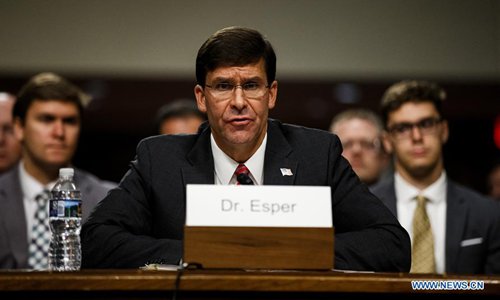HOME >> OPINION
US attempts to woo Europe doomed to fail
Source:Global Times Published: 2019/9/8 21:08:39

US Secretary of Defense Mark Esper Photo: Xinhua
US Defense Secretary Mark Esper, who is on a European tour, has spared no efforts in making an issue of "China threats" to Europe. Speaking Friday at the Royal United Services Institute, a London-based think tank, he warned US allies to reduce their dependence on the Chinese economy and asked the audience to imagine what a world dominated by China might look like. He also attacked China and Russia for disrupting the international order and emphasized that great power competition is once again the prime concern of US national security.Washington longs to form a "unified front" with European countries to confront China. But if Esper and his US colleagues try to mobilize the Europeans, they will find them not interested in following. Washington knows that it's difficult to establish an anti-China camp today like the one against the former Soviet Union.
At the same time Esper was hyping "China threats," German Chancellor Angela Merkel was visiting China, accompanied by a large business delegation. Geopolitics can no longer dominate everything. Instead, economic development has been prioritized for national interests. As such, China is an important partner for Europe to seek development. From a geopolitical perspective, most Europeans do not think that China poses a Soviet-style threat to them. The biggest challenge facing Europe now is a lack of economic vitality. The US government is using a coercive economic policy against Europe. Reinforcing China-EU cooperation will serve as a lever to change the US attitude. This is a new geopolitical situation Europe is facing.
Constrained by its high-profile "America First" strategy, Washington has neither the power nor willingness to invest resources to maintain the prosperity of Europe. The common interests of the West are rapidly shrinking. Values such as environmental protection and free trade, which Europe is advocating, have been disregarded by the US. The US and Europe are finding less and less in common apart from human rights.
Common values cannot conceal the growing differences in interest between the US and Europe. Nowadays common values, together with some coercive measures, are often used by Washington as a tool to trick Europe and play into the hands of the US.
5G is a typical example. The US priority for its national security is to prevent Chinese enterprises from overtaking the US. Washington is afraid of losing in the competition. But this is not a great concern for European countries. European countries do not want to fall behind in 5G construction. The US prevents European countries from using Huawei devices and from constructing a more advanced 5G network than the US.
The US will not successfully rope in Europe to contain China. Washington's European allies are unlikely to form an anti-China alliance with the US. The fundamental reason is that China is not a bad country. Although China and Europe have differences in values, China does not forcefully export its values. China is sincere in peaceful development and reciprocal cooperation. There is no reason for European countries to confront China strategically.
Some US political elites have wishful thinking to start a cold war with China. This is against the globalization era. They are facing a strong, peaceful and open China with huge potential. Washington will only isolate itself by advocating China containment and forcing allies to follow the US suit.
Posted in: EDITORIAL